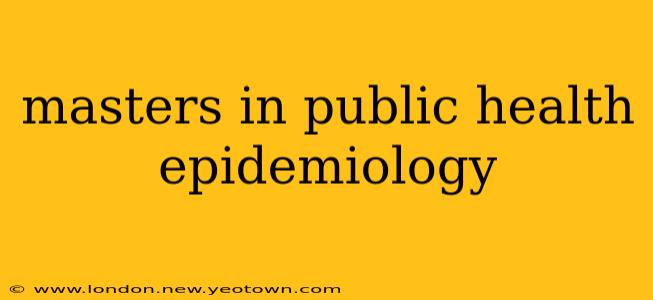Charting a Course to Public Health Impact: A Journey Through a Master's in Public Health Epidemiology
The bustling city streets, the quiet countryside, even the seemingly isolated corners of the world – all are touched by the invisible forces of disease and health disparities. For those driven by a desire to understand these forces and improve the well-being of populations, a Master's in Public Health (MPH) with a specialization in epidemiology offers a compelling path. This isn't just about numbers and data; it's about unraveling the mysteries of disease outbreaks, identifying vulnerable populations, and ultimately, saving lives.
My own journey toward an MPH in epidemiology began with a simple question: Why? Why were some communities disproportionately affected by certain diseases? Why did some interventions succeed while others failed? The answers, I discovered, lie in the intricate world of epidemiology.
What is Epidemiology, Anyway?
Epidemiology, at its core, is the detective work of public health. Epidemiologists are the disease detectives, meticulously piecing together clues to understand the distribution, causes, and control of diseases and health-related events in populations. It’s a blend of science, statistics, and social understanding, requiring both analytical prowess and a compassionate heart.
What Does a Master's in Public Health Epidemiology Curriculum Entail?
The curriculum of an MPH in epidemiology typically provides a robust foundation in several key areas:
-
Biostatistics: This is the language of epidemiology. You'll learn to analyze complex datasets, interpret statistical findings, and draw meaningful conclusions. Think of it as learning to speak fluently the language of public health data.
-
Epidemiologic Methods: This is where you learn the investigative techniques – designing studies, collecting data, and analyzing the results to identify patterns and risk factors. It’s the art of asking the right questions and finding the answers within the data.
-
Environmental and Occupational Epidemiology: This explores the impact of environmental factors – pollution, toxins, workplace hazards – on health outcomes. It's understanding how our surroundings shape our well-being.
-
Infectious Disease Epidemiology: This delves into the dynamics of infectious diseases – their transmission, prevention, and control. Think about understanding and combating outbreaks like influenza or COVID-19.
-
Chronic Disease Epidemiology: This focuses on understanding the long-term health conditions like heart disease, cancer, and diabetes, exploring risk factors and prevention strategies. It’s about addressing the often-silent killers that impact our global health landscape.
What are the Career Prospects After Completing an MPH in Epidemiology?
An MPH in epidemiology opens doors to a wide range of rewarding career paths:
-
Epidemiologist: This is the classic role, involving investigating outbreaks, designing and conducting research, and analyzing data to inform public health interventions.
-
Public Health Analyst: Analyzing data to inform policy decisions, evaluating programs, and communicating findings to policymakers and the public.
-
Biostatistician: Applying statistical methods to analyze health data and draw conclusions about the effectiveness of interventions.
-
Health Researcher: Conducting research studies to understand the causes and spread of diseases and evaluate the impact of interventions.
-
Consultant: Providing expertise to governments, organizations, and businesses on public health issues.
How Long Does it Take to Complete an MPH in Epidemiology?
Most MPH programs in epidemiology can be completed in 1-2 years of full-time study. Many programs also offer part-time options for those balancing work and studies.
What are the Admission Requirements for an MPH in Epidemiology Program?
Admission requirements vary depending on the specific program, but typically include a bachelor's degree (often in a related field like biology, public health, or social sciences), a strong academic record, letters of recommendation, and sometimes the GRE or other standardized tests.
What are the potential salary expectations after earning an MPH in Epidemiology?
Salary expectations vary considerably depending on location, experience, and the specific role. However, those with an MPH in epidemiology generally command competitive salaries, reflecting the importance of their work in protecting public health.
Is an MPH in Epidemiology Worth It?
For those with a passion for public health and a desire to make a tangible difference in the world, an MPH in epidemiology is undoubtedly a rewarding investment. It's a challenging but fulfilling path that combines rigorous academic training with the opportunity to contribute meaningfully to the health and well-being of communities everywhere. The journey is demanding, but the impact is immeasurable. It’s a chance to be part of a global effort to improve lives, one investigation, one intervention, one healthy community at a time.

